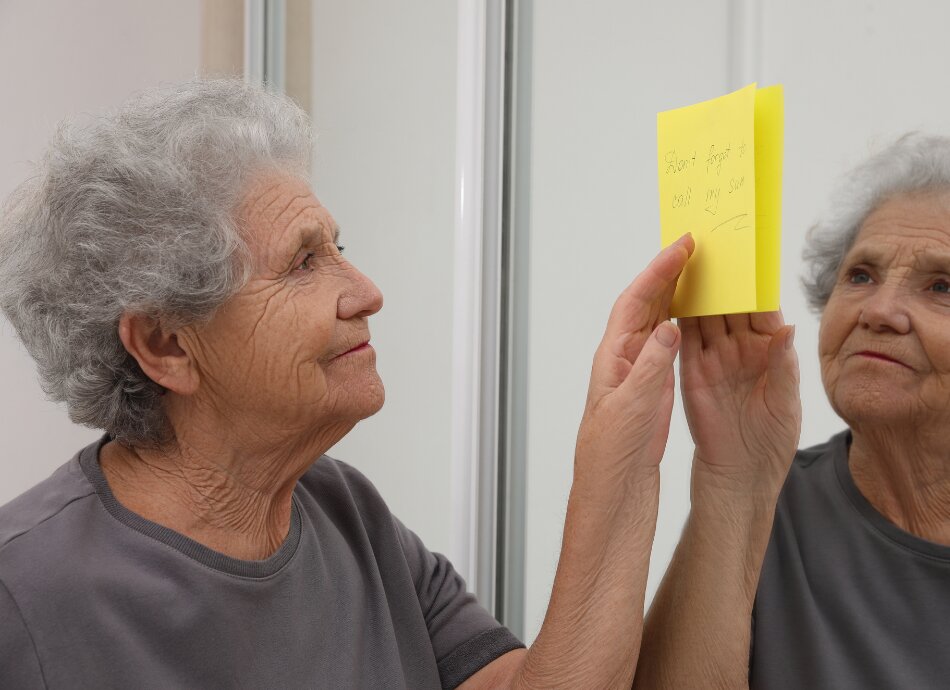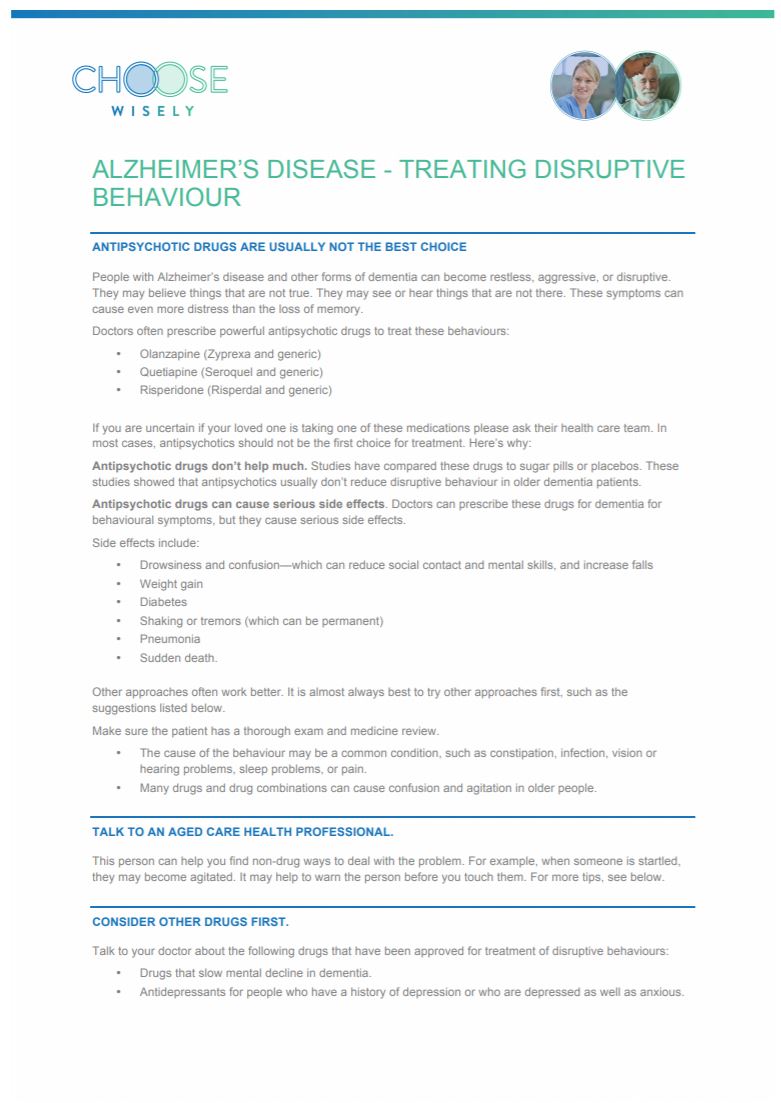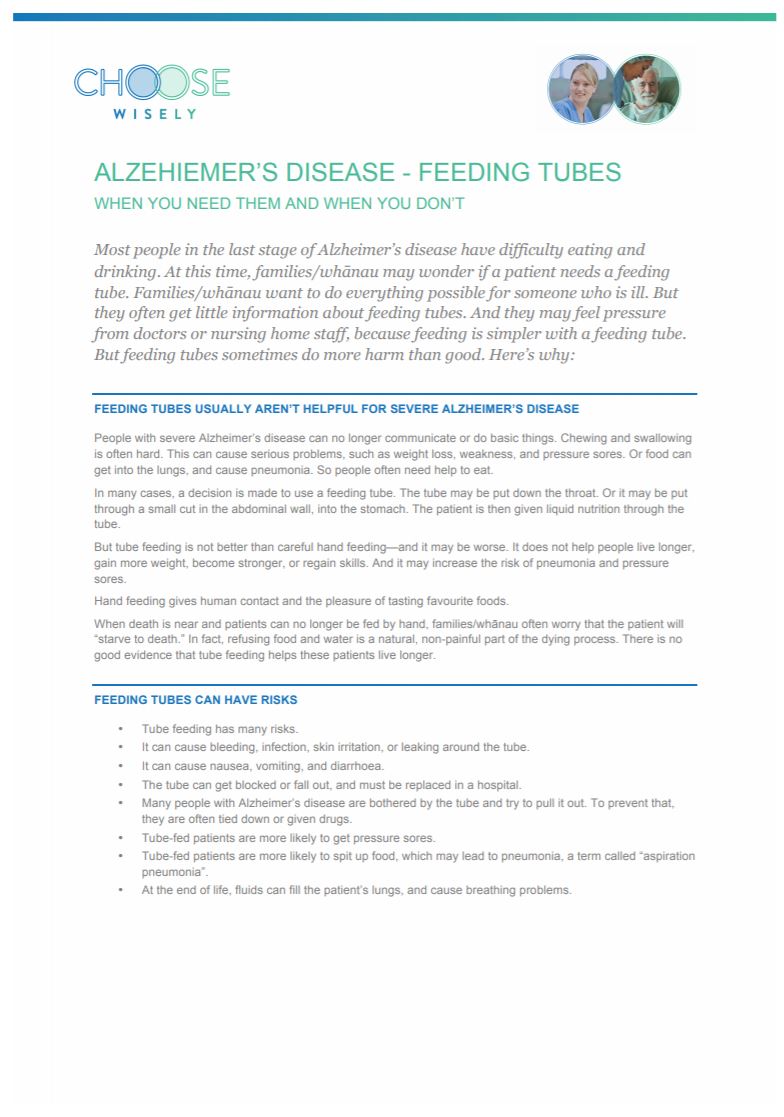Low or no data? Visit zero.govt.nz, scroll down the page then click on our logo to return to our site and browse for free.
Alzheimer's disease
Key points about Alzheimer's disease
- Alzheimer's disease is a form of dementia that causes a gradual decline in your ability to remember, understand, communicate and reason.
- It is the most common form of dementia – about two-thirds of people with dementia have Alzheimer’s.
- Growing older is the most significant risk factor.
- With more people living longer, Alzheimer's is becoming more common.
- Symptoms usually develop slowly and get worse over time.
- There is no cure for Alzheimer's disease, but a combination of drug therapy, lifestyle changes and behavioural treatment may help with symptoms but will not stop the process of decline.

Alzheimer’s disease is a form of dementia – a general term used to describe symptoms that occur when there is a decline in brain function. Dementia may include problems with memory, thinking, behaviour and the ability to perform daily tasks.
Symptoms of Alzheimer’s are due to physical changes in your brain, including shrinkage and a build-up of abnormal proteins (plaques and tangles). Tangles lead to the death of brain cells. These changes are associated with a shortage of some important chemicals needed for sending messages around your brain.
Alzheimer's is a progressive disease, which means that gradually, over time, more parts of your brain are damaged. As this happens, the symptoms become more severe.
It's likely that a combination of factors, including age, genes inheritance and environmental factors are responsible.
Age: This is the greatest risk factor for dementia. Dementia affects about 1 in 20 people over the age of 65 and 1 in 5 over the age of 80. About two-thirds of these will have dementia caused by Alzheimer's disease. However, younger people can also get early-onset dementia, about half of whom will have Alzheimer's disease.
Genetic inheritance: A number of genes have been identified that increase the risk of developing the condition. The chance of developing Alzheimer's disease is greater if you have a parent or sibling with the condition. However, very few families have a direct inheritance of the condition from one generation to the next, and where they do, it usually appears early in life.
Environmental factors: People with an increased risk of developing Alzheimer's disease include those who:
- are smokers
- have high blood pressure
- have diabetes
- have high cholesterol levels.
Read more about risk factors for dementia.
Video: The Genetics of Alzheimer's
This video may take a few moments to load.
(About Alzheimer's, US, 2010)
While there are some common symptoms of Alzheimer's disease, everyone is unique. No two cases of Alzheimer's are likely to be the same. People in the early stages of Alzheimer's disease experience lapses of short-term memory. As the disease progresses they may:
- have increasing difficulty managing complex or new tasks
- frequently forget the names of people, places, appointments and recent events
- show a lack of initiative or withdrawal from usual activities
- experience emotional and personality changes, such as frustration, anxiety or sadness
- become more irritable, suspicious or emotionally unresponsive in the face of their increasing disability
- have problems finding the right words or understanding what is said to them.
If you are concerned you or someone close to you may have symptoms of Alzheimer's disease or dementia, it is a good idea to see your doctor. An early diagnosis will:
- help you plan for the future
- enable you to benefit from the treatments available
- help you identify and access early sources of advice and support.
There is no straightforward test for Alzheimer’s. A diagnosis is usually made by excluding other possibilities such as depression, delirium, thyroid problems, side effects of medicines, vitamin deficiencies or a brain tumour.
Most people with Alzheimer's also have arterial disease of the brain (cerebrovascular disease or CVD), and their diagnosis is mixed dementia (ie, Alzheimer's and cerebrovascular disease).
Your GP may ask a specialist for help in establishing a diagnosis.
Tests for Alzheimer's often include:
- blood tests and a full physical examination to rule out or identify any other medical problems
- a cognitive and memory assessment of a range of brain functions including memory, thinking and language skills
- a CT (computerised tomography) head scan to give clues about the changes taking place in your brain.
Less often, you have have an MRI (magnetic resonance imaging) or, rarely, a SPECT (single-photon emission computed tomography) scan.
There is currently no cure for Alzheimer's disease. However, there are a number of treatments to help slow the progression of the disease.
Lifestyle changes
Lifestyle factors can affect dementia risk and by changing those, you may be able to slow your cognitive decline. Factors to consider include:
- getting regular exercise
- avoiding or reducing alcohol and other substance use
- eating a healthy diet
- getting enough sleep.
It may also be useful to do brain exercises and practice memory strategies.
Cognitive stimulation therapy
In some regions, there is the option of cognitive stimulation therapy (CST). This is a structured group treatment developed for people with mild to moderate dementia. It consists of 14 sessions with a range of activities and discussions aimed at general enhancement of cognitive and social functioning. The sessions actively engage people with dementia, while providing an optimal learning environment, and the social benefits of being part of a group. CST has been found to be an acceptable psychological therapy for older people with a clinical diagnosis of mild to moderate dementia. Some rest homes and private hospitals also run similar programmes to CST.
Heart risk factors
Management of heart risk factors may benefit all types of dementia. Generally, what is good for your heart is good for your brain. Read about heart risk assessment.
Medication
There are medications that can help some people with the symptoms of forgetfulness and confusion in earlier stages. These medicines fall into 2 categories:
- cholinesterase inhibitors (such as donepezil, rivastigmine and galantamine)
- NMDA receptor antagonists (such as memantimine).
Cholinesterase inhibitors
These work by enhancing the levels of a chemical in the brain (called acetylcholine) that is involved in memory and judgment. Read more about medicines for dementia.
However, a number of drug treatments are available that can help with some of the symptoms or hold back progression of the disease (on average, by 6–12 months) in some people.
Acetylcholinesterase inhibitors are one such group and include the following:
- Donepezil (Aricept), rivastigmine (Exelon) and galantamine (Reminyl).
- These drugs work by boosting existing supplies of acetylcholine.
- People with Alzheimer's have been shown to have a shortage of the chemical acetylcholine in their brains.
- These drugs are mainly helpful for people with mild or moderate Alzheimer's disease.
- Side effects may include reduced appetite, nausea, indigestion, diarrhoea, fatigue, sleep disturbances, incontinence of urine and slowing of the heart rate.
- Only some are currently subsidised in New Zealand.
- Rivastigmine is available in a once-a-day patch as well as the tablet form, and the patch may have benefits for some patients with mild to moderate Alzheimer's disease.
NMDA receptor antagonists
An NMDA receptor antagonist drug, memantine (Ebixa), is also available in New Zealand.
- This drug works in a different way to the other three – it prevents the excess entry of calcium ions into brain cells.
- Excess calcium in the brain cells damages them and prevents them from receiving messages from other brain cells.
- Memantine is promoted as having benefit in more advanced cases of Alzheimer's disease.
- Side effects may include hallucinations, confusion, dizziness, headaches and tiredness.
Care planning meeting
Plan ahead so that you have more say in your future. Arrange a meeting (or get someone else to do it) with all the people involved in your care. This may include your carer, family/whānau members, or your practice nurse or GP.
Agree on a care plan to support you to stay as well as possible for as long as possible. This might include:
- having a driving assessment
- arranging enduring power of attorney
- writing or updating your will
- developing an advance care plan
- accessing services to help you stay independent for as long as possible
- learning about your condition.
Having a driving assessment
Driving requires quick reflexes and decision making. Having a driving assessment helps you work out whether it is safe for you to continue driving for now, and if not, how you will manage without driving. The AA driving tests are not sufficient for this purpose so you would need to pay for a private medical driver assessment through services such as through OTRS rehabilitation services(external link)(external link). Read more about dementia and driving.
Arranging enduring power of attorney
Having an Enduring Power of Attorney (EPA) means you can have peace of mind that you have decided, ahead of time, who you trust to make decisions for you if you can’t decide for yourself. Read more about enduring power of attorney.
Writing or updating your will
A will sets out your wishes in terms of who to leave your possessions and money to and states who you would like to carry out your wishes. It can include special instructions for a funeral. If you don’t have a will, it could also put your family into legal and financial difficulties. Learn more about making a will(external link)(external link).
Developing an advance care plan
An advance care plan is a way to record your wishes in terms of current and future medical care. It is an ongoing process of talking with those closest to you and getting information to help you make decisions about your care. It can include end of life planning. Read more about advance care planning.
Accessing services
Find out about services early on that can help you and help your carer to support you. Start with a free half-hour consultation with the Public Trust(external link)(external link). This is available to existing and newly diagnosed dementia patients, their families and supporters. Freephone 0800 156 015 to book.
Westpac offers dementia-friendly banking(external link)(external link)
Learning about your condition
Learning about dementia can help you plan for the future as well as stay independent for as long as possible. See these resources and videos and other links under Learn more below.
These personal stories reveal the challenges that come with Alzheimer's disease, not just for the individual but for family too.
Video: Living well with dementia – Rita's story
This video may take a few moments to load.
(Alzheimers NZ, 2018)
Video: Living well with dementia – Helen's story
This video may take a few moments to load.
(Alzheimers, NZ, 2018)
Video: Together apart
This video may take a few moments to load.
Filmmaker, Suzi Jowsey, bravely follows her own family’s tough journey of caring for their mum who has Alzheimer’s.
(AttitudeLive, NZ, 2015)
Video: A message for patients and their families
This video may take a few moments to load.
This video talks about getting support and things you should consider if you or a family member are diagnosed with Alzheimer's disease.
(About Alzheimer's, US, 2010)
Video: The penny drops – Tania’s story
This video may take a few moments to load.
(Alzheimer's NZ, NZ, 2016)
Video: Yep, my dad has dementia – Victoria’s story
This video may take a few moments to load.
(Alzheimer's NZ, NZ, 2019)
Video: Kids Look at Alzheimer's Disease: Is It Me or the Disease?
This video may take a few moments to load.
Does it seem like the person you know with Alzheimer’s is changing? You’re right! Watch this video to find out more about those changes and how to talk about them with friends and family.
(The Alzheimers Association, US, 2011)
Video: Kids Look at Alzheimer's Disease: How Can I Help and What's Out There to Help Me?
This video may take a few moments to load.
There are many ways children and teenagers can make a difference in the lives of those with Alzheimer's disease and their families. Watch this video to find out what you can do to help.
(The Alzheimers Association, US, 2011)
Video: Teens Look at Alzheimer's Disease: If the Person with Alzheimer's Lives with Us, What Can I Expect?
This video may take a few moments to load.
It may seem like the person with Alzheimer's is changing in ways that make your relationship different, but why? The answer is almost always that the disease is responsible for the changes, and keeping that in mind will allow you to cope with the situation more easily. Watch this video to learn more, and to explore making some changes of your own.
(The Alzheimers Association, US, 2011)
Video: Teens Look at Alzheimer's Disease: How Can I Help and What's Out There to Help Me?
This video may take a few moments to load.
There are many ways people your age can make a difference in the lives of those with Alzheimer's disease and their families. Start by talking openly about it and informing your peers. Watch this video to find out how you can help move us toward a world without Alzheimer's.
(The Alzheimers Association, US, 2011)
- Alzheimers NZ(external link)(external link)(external link) Phone support 0800 004 001
- Find your local Alzheimer's NZ branch(external link)(external link)(external link)
- Dementia NZ (external link)(external link)(external link)
- NZ Dementia Cooperative(external link)(external link)(external link)
- Carers NZ(external link)(external link)(external link) 0800 777 797
- More dementia support groups(external link)
- Eldernet(external link)(external link)(external link) Information service on issues affecting older New Zealanders
- Seniorline(external link)(external link)(external link) Information on how to get help at home, community services and rest homes
Information and support(external link)(external link) Alzheimer's NZ
Information sheets(external link)(external link) Dementia NZ
About dementia(external link)(external link) Dementia Australia
Dementia(external link)(external link) NHS Choices, UK, 2017
Dementia help sheets Dementia Australia(external link)
This is our story – a qualitative research report on living with dementia(external link)(external link) Alzheimer's NZ, 2019
Resources
Note: Some resources below are from overseas so some details may be different. In New Zealand, phone 111 for emergencies, or if it is not an emergency, phone Healthline 0800 611 116.
References
- Memory loss and dementia(external link)(external link) Patient Info, UK, 2017
- Can dementia be prevented?(external link)(external link) NHS, UK, 2017
- Cognitive stimulation therapy – a New Zealand pilot(external link)(external link) Te Pou, NZ, 2014
See the page Alzheimer's disease information for healthcare providers.
Brochures

Choosing Wisely, NZ, 2016

Choosing Wisely, NZ, 2016
Credits: Healthify editorial team. Healthify is brought to you by Health Navigator Charitable Trust.
Reviewed by: Dr Helen Kenealy, geriatrician and general physician, CMDHB
Last reviewed:
Page last updated:





